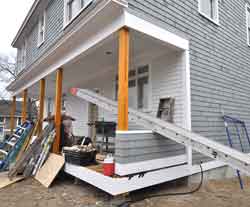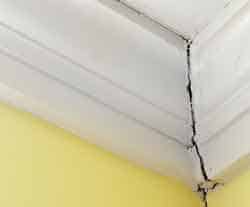 Home builders make their money, and buyers rely on their home builder, to bring together quality products, materials and workmanship to build your house. When we built a house in New York, it helped when the local building department told us we were working with a B builder, meaning good quality and affordable. Years later, we only talked to home builders recommended by our architect for a 4-story addition in Portsmouth, NH (see Remodeling a 100 Year Old Victorian).
Home builders make their money, and buyers rely on their home builder, to bring together quality products, materials and workmanship to build your house. When we built a house in New York, it helped when the local building department told us we were working with a B builder, meaning good quality and affordable. Years later, we only talked to home builders recommended by our architect for a 4-story addition in Portsmouth, NH (see Remodeling a 100 Year Old Victorian).
You're thrilled at the closing when you get the keys! You tend to overlook the fact that you're also assuming responsibility for every aspect of your home. That's where a home builder warranty provides peace of mind and support in negotiating repairs when you do find yourself with a serious construction problem.
Types of Home Builder Warranties
There are different warranty programs available depending on where you're building and how you're financing your house. The Federal Trade Commission responsible for protection, listed the following builder warranty programs:
- Home warranties backed by the home builder.
- Builders can also choose to buy a warranty from an independent company that assumes responsibility for certain claims.
- Homeowners also have the option of buying additional coverage from a third-party warranty company, to supplement the coverage their builder provides.
Mortgages backed by the FHA and VA require builders to purchase a third-party, home builder warranty. Each state has different home builder warranty requirements, some of them laws and others based on case law, so it's best to check with your state's Attorney General Office.
A home builder warranty is typically broken up into one, two and ten year terms, based on the type of repair needed. You'll probably get a one-year warranty for labor and materials, two years of protection for mechanical defects (plumbing, electrical, heating, air conditioning and ventilation systems) and ten years for structural defects.
What's Typically Included in a Builder Warranty
Before you close on your new home, you should do a final walk-through and prepare a “punch list” of items your builder is responsible for under warranty. It's much easier to get builders to correct problems found before you move in and if you want help, consider having a home inspector do another review before your warranty period ends.
The coverage provided by home builder warranty programs focuses on workmanship and materials, and typically defines how repairs will be made. The home components covered include the following with different components having 1 or 2 years of coverage.
- Heating, ventilation and air conditioning (HVAC) systems.
- Plumbing and electrical systems.
- Roofs and siding, doors, windows and trim.
- Drywall and painting, generally for 1 year.
Knowing what's covered and for how long is key. It's not unusual for nail pops and minor cracks in drywall to occur in the first year but don't wait to claim these repairs beyond that time. When my handyman business did work for home builders, we tried to schedule a final visit in month 11, so all warranty repairs could be completed by the end of the first year but that's really the homeowner's responsibility.
What's Gets Excluded from a Builder Warranty
There are expenses that a builder warranty won't cover, and you want to understand to understand what home builders are responsible for, and also what your responsibilities are as the homeowner.
 Home appliances that are consumer products like your refrigerator and dishwasher, come with their own warranties which the builder should transfer to you.
Home appliances that are consumer products like your refrigerator and dishwasher, come with their own warranties which the builder should transfer to you.- Even though builders may include outside features, they aren't covered by most home builder warranties – detached garages, driveways, walkways, patios and decks and other landscaping features.
- The builder warranty doesn't cover normal wear and tear of construction materials within expected levels, i.e. small cracks in brick, cement or tile.
- Problems due to weather conditions, natural disasters, soil movement or settling.
- Damage caused by misuse or neglecting basic home maintenance responsibilities like cleaning the gutters, draining the hot water heater, touching up caulk or grout and normal pest control procedures.
- Failure to insure there is adequate ventilation and humidity control, in both conditioned living spaces and unconditioned areas like the attic.
- Damage caused by people you hired to work on your house or outsiders (vandals, animals, etc) or “acts of God”.
- A builder warranty does not cover housing costs and expenses if you have to move out of your home while repairs are made.
Disclaimer: Article provides general information only. The information is not provided as advice for a specific matter, nor is it provided by an attorney. Laws vary from one state to another. For legal advice on a specific matter, you should consult with an attorney.






Leave a Reply